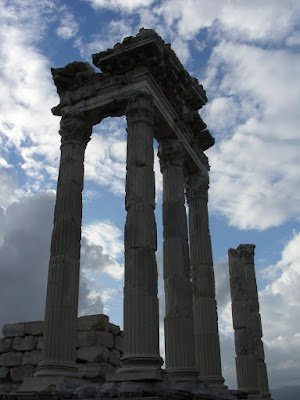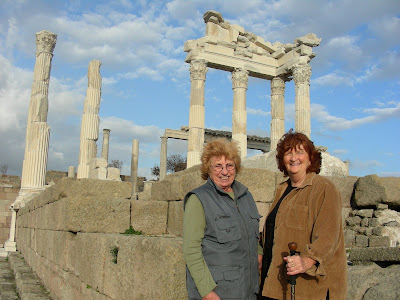
This morning started with the call to prayer once again, only this time it was still dark and there was no wind to interfere with the haunting sounds. I recorded it again, and then we managed to get our tired bodies rolling around in time to have the bags out the door by 6:30. Our stay on this one short night was in the Hotel Akol. I read several reviews and expected things to be dicey, but the beds were comfortable, the bath was clean, and there was even a door that we could open to smell the fresh air of the Dardanelles, even in the dark, you can tell you are near the sea.
We went down for another typical Turkish buffet breakfast of cheeses, breads, hard boiled eggs, and yogurt with many kinds of honeyed fruits. The coffee always is good and strong without being bitter, but I have yet to actually drink the official Turkish coffee, according to Suleyman, it’s ground to a very fine silky powder, boiled slowly in a Turkish copper pot and sipped carefully so you don’t stir up the sludge in the bottom of the cup. I’ll have to find some soon.
The first leg of the day was a short bus ride to Troy, Truja it is called here in Turkey. Suleyman is again very good at telling us the history and myths of the area where we are traveling. I have my trusty guidebook, "Eyewitness Guide to Turkey", but I still enjoy his stories and his perspective. Traveling with 43 people is interesting, some quite nice, others a true pain in the neck, but so far we have managed to keep to ourselves most of the time, with nice pleasantries but nothing too memorable, good or bad.
Troy has been inhabited for several thousand years, for many reasons, no doubt, but probably most importantly for its strategic location on the Dardanelles, guarding this gateway into the inner reaches of Asia Minor, and the Black Sea. What was most interesting was the fact that Homer’s Troy was the 6th level of 9 different levels of civilization that have existed there. When the site was first discovered in the late 19th century, there were no protections in place and much of the wonders were looted, moved, sold, and lost, with some of the finest treasures lost to Germany, then to Russia during WWII. We walked around the ruins, listening to the history and the stories, and I looked out across the beautiful agrarian landscape thinking of what it must have been like to live here. Suleyman discussed the theory again that the cultures of this land existed for millennia without actually having any sign of war, with trade and communications between various people going on for a long time peacefully. But people were beginning to discover power, and war actually became a real concept right here in Troy, and even though much of Homer’s story might be mythological, the strategic location of Troy is undisputed.
As Mo and I left, she said that it wasn’t very impressive, and didn’t feel anywhere near as magical as the temples in Malta felt. I suggested that might be due to the “energy” of the place, the fact that Malta was probably a sacred retreat for spiritual uplifting purposes, and Troy was a city most often functioning as a defense against aggression and war. Maybe, maybe not, but while it was fascinating, it didn’t particularly move either of us.
 Back into the bus again for a long drive across the countryside of Turkey, which is amazingly beautiful. We drove up through the mountains, past Mt Ida, mentioned in the Illiad and in the Bible, and winding narrow very high roads gave us our first view of the Aegean Sea. The fall colors have started to turn, and especially in the mountains there are oaks and what looks a bit like birch or aspen that are golden and yellow. The highway dropped down along the coast, through myriad small coastal towns that looked a bit drab until we started getting into areas that still had a bit of Greek influence from the time prior to 1923. It seems that there was some sort of trade made when Attaturk created the present country of Turkey, and a million and a half people had to be relocated as a result. Greek Orthodox people living in Turkey were relocated to Greece, and Islamic Turkish people living in Greece were uprooted and forcibly moved to this part of Turkey.
Back into the bus again for a long drive across the countryside of Turkey, which is amazingly beautiful. We drove up through the mountains, past Mt Ida, mentioned in the Illiad and in the Bible, and winding narrow very high roads gave us our first view of the Aegean Sea. The fall colors have started to turn, and especially in the mountains there are oaks and what looks a bit like birch or aspen that are golden and yellow. The highway dropped down along the coast, through myriad small coastal towns that looked a bit drab until we started getting into areas that still had a bit of Greek influence from the time prior to 1923. It seems that there was some sort of trade made when Attaturk created the present country of Turkey, and a million and a half people had to be relocated as a result. Greek Orthodox people living in Turkey were relocated to Greece, and Islamic Turkish people living in Greece were uprooted and forcibly moved to this part of Turkey.We had lunch in a hotel restaurant that can handle 43 people and continued on to our afternoon visit to Pergamon. I need the time to sit with a thesaurus so I can come up with words other than wondrous, gorgeous, magical, lovely, fascinating, dramatic, magnificent. These words don’t begin to do justice to what it feels like to climb up the narrow winding road to this temple remains overlooking Bergamon and the Aegean Sea. The history of this place is complex, with mythology and actualities mixed together into a plethora of images, but the hard reality of huge marble columns and quarried andesite walls is right there to feel and to see. The wind was blowing hard, with clouds coming from the west, but giving us breaks in the light that made it all the more delightful. Pergamon had one of the greatest libraries of all civilization, second only to Alexandria, and eventually all the books were moved to Alexandria. Pergamon was also the place where books were actually invented. Until this time, writing was on papyrus, but here they discovered how to use parchment. Since parchment was heavier and couldn’t be rolled, they had to cut it into squares and lay the squares on top of one another. Books. Here. In Pergamon. This was a place of worship and of culture, with a magnificent amphitheater built in the Hellenistic style that used the actual relief of the landscape as part of the structure. It was more than incredible. I need to work on my writing skills for this trip, I am sure, but these words will have to do for now. Thank goodness for photos.
 We are on the bus again, and it is dark, after a lovely sunset over the Isle of Lesbos, which is visible here along the coast. Our destination is Kusadasi, where we will actually get to stay for two nights in a row. Ahhh. Dinner will again be some kind of buffet, but if we don’t get there till 830 or so, I guess we will be eating European style at some ungodly hour. Mo is doing better today, with her cold beginning to recede. Hopefully by tomorrow she will be back up to par all the way, and knock on wood, hopefully her cold will remain hers. No sharing needed!
We are on the bus again, and it is dark, after a lovely sunset over the Isle of Lesbos, which is visible here along the coast. Our destination is Kusadasi, where we will actually get to stay for two nights in a row. Ahhh. Dinner will again be some kind of buffet, but if we don’t get there till 830 or so, I guess we will be eating European style at some ungodly hour. Mo is doing better today, with her cold beginning to recede. Hopefully by tomorrow she will be back up to par all the way, and knock on wood, hopefully her cold will remain hers. No sharing needed!

No comments:
Post a Comment
I love your comments, they add so much, but to avoid ridiculous amounts of spam, I will be moderating comments